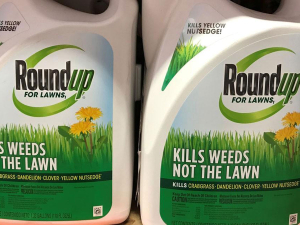Greenpeace fearmongering on glyphosate - Feds
Federated Farmers says climate protest group Greenpeace is manufacturing outrage and attempting to scare New Zealanders with headlines that have no basis in science.
 Glyphosate is the active ingredient in weedkillers such as Round Up, widely used by growers and orchardists.
Glyphosate is the active ingredient in weedkillers such as Round Up, widely used by growers and orchardists.
A charitable trust, which unsuccessfully pushed for a review of glyphosate use in the country, says it is disappointed by the decision of the Environmental Protection Authority (EPA).
Environmental Law Initiative, which uses litigation, advocacy and education to protect NZ’s environment and biodiversity, says it provided a large amount of information to the EPA on the effects of glyphosate, including evidence that glyphosate has significant impacts on human and environmental health. Glyphosate is the active ingredient in weedkillers such as Round Up, widely used by growers and orchardists.
Dr Matt Hall, director, research and legal at ELI told Rural News that the EPA has acknowledged that this information was new to them but has found that the information was not significant.
“We struggle to understand how information which shows glyphosate has impacts on the human nervous system, endocrine system and acts as a possible human carcinogen is not deemed to be significant.
“We will closely scrutinise the decision and will assess whether there are grounds for an appeal.”
The ELI applied to the EPA in February 2024 to decide whether there are grounds to reassess glyphosate and glyphosate-containing substances, citing significant new information about the negative effects of the substance.
“After reviewing information provided by ELI and recent international research on the substance, a decision-making committee of the EPA has decided there are no grounds for a reassessment,” the EPA says.
"What we received from the applicant does not meet the criteria for significant new information and does not justify a reassessment of this substance - particularly when considered alongside the findings of other international regulators," says Dr Chris Hill, EPA general manager hazardous substances and new organisms.
Regulators from jurisdictions including the European Union, Australia, and the US extensively reviewed glyphosate. They concluded it should not be classified as a carcinogen and that any potential risks from using the substance have not changed.
"We carefully weighed the information provided by the applicant alongside a large amount of other evidence and consider that products containing the substance are safe to use if the existing rules are followed," says Hill.
"We will review any new research on glyphosate that shows a change in the risks and is relevant to the New Zealand context."
The Meat Industry Association of New Zealand (MIA) today announced that Chief Executive Officer Sirma Karapeeva has resigned from the role.
The winners of the 2026 Hawke’s Bay/Wairarapa Dairy Industry Awards were announced at the annual awards dinner held at Copthorne Solway Park in Masterton on Thursday evening.
Environment Southland is welcoming this week’s decision by the Environmental Protection Authority (EPA) to approve the release of Blaptea elguetai, a leaf‑feeding beetle that will help control the highly invasive Chilean flame creeper.
This March, the potato industry is proudly celebrating International Women’s Day on 8 March alongside the International Year of the Woman Farmer, recognising the vital role women play across every part of the sector — from paddocks and packhouses to research, leadership, and innovation.
Fruit trader Seeka posted a record profit and returns to shareholders in 2025.
Recent weather events in the Bay of Plenty, Gisborne/Tairawhiti, and Canterbury have been declared a medium-scale adverse event.

OPINION: A mate of yours truly reckons rural Manawatu families are the latest to suffer under what he calls the…
OPINION: If old Winston Peters thinks building trade relations with new nations, such as India, isn't a necessary investment in…